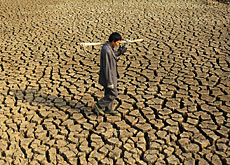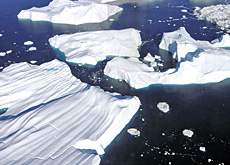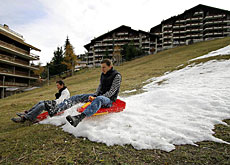Mankind to blame for climate change

Global warming is apparently here to stay, with a United Nations climate panel warning that it is "very likely" man-made, and could last for more than 1,000 years.
Swiss researcher Fortunat Joos, one of the authors of a 21-page report released on Friday by the Intergovernmental Panel on Climate Change (IPCC), told swissinfo that it was time now to act on climate change.
The report – in fact a summary for policymakers of recent research – highlighted “increases in global average air and ocean temperatures, widespread melting of snow and ice, and rising global mean sea level”.
It warned that no matter how much civilization slows or reduces its greenhouse gas emissions, global warming and sea-level rise would continue for centuries.
But Joos, a professor at Bern University’s climate and environmental physics institute, says that if we act now, some effects of climate change could be mitigated.
swissinfo: According to the report, human activity has most likely influenced climate change. Does this accurately reflect the opinion of the scientific community?
Fortunat Joos: The vast majority of climate scientists are convinced that global warming is ongoing. There is so much evidence that warming is happening everywhere and also plenty of proof that humans are altering the composition of the atmosphere.
Measurements have shown that greenhouses gases such as carbon dioxide and methane are at their highest levels in the past 650,000 years.
We also know that volcanic activity and solar energy changes combined have actually cooled the atmosphere, so it is evident that human activity has been driving global warming over the past decade.
swissinfo: The summary uses the term “very likely” – a 90 per cent probability in scientific terms – to describe the influence of human activity on global warming. What is still uncertain?
F.J.: The Earth is a complex system, so there is a chance that we don’t understand everything.
What we don’t have are complete records extending over millennia, so there are some grey zones.
During the drafting of the document, there was some discussion if the wording should be stronger, but the decision was to err on the side of caution. But nine out of ten remains a very high probability.
swissinfo: You say the summary is a cautious document. Aren’t you providing ammunition to those who want to deny global warming or at least its impact?
F.J.: I don’t think so. Over the past 17 years, the IPCC has tried to present the scientific evidence in a balanced way and not to be on the alarmist side or deny the facts.
The IPCC’s statements have become more robust over time, with more supporting data.
Sceptics now have a very hard time arguing against these scientific findings. They now tend to take another line, arguing for example that the cost of global warming is exaggerated.
swissinfo: The summary is targeted at policymakers. Like all documents it has its use, but will its findings influence policy?
F.J.: The summary clearly says warming is ongoing, that humans are responsible and that climate change will continue with negative consequences. I think that’s easy enough for a policymaker to understand.
Whether they want move towards fossil fuel-free technologies that improve energy efficiency depends though on personal opinions and interests.
If we move towards a fossil-free system, there will be some economic sectors that will be among the losers, but many others, and we as a society, will be winners.
swissinfo-interview: Scott Capper
The Intergovernmental Panel on Climate Change (IPCC) was established in 1988 by two UN organizations, the World Meteorological Organization (WMO) and the United Nations Environment Programme (UNEP) to assess the “risk of human-induced climate change”.
The Panel is open to all members of the WMO and UNEP.
IPCC reports are widely cited in almost any debate related to climate change.
National and international responses to climate change generally regard the UN climate panel as authoritative.
IPCC projections:
Probable temperature rise between 1.8 and 4° Celsius.
Possible temperature rise: up to 6.4° Celsius.
Sea level most likely to rise by up to 43 centimetres.
Arctic ice will probably disappear between 2050 and 2100.
More heatwaves very likely.
Intensity of tropical storms also likely to increase.

In compliance with the JTI standards
More: SWI swissinfo.ch certified by the Journalism Trust Initiative











You can find an overview of ongoing debates with our journalists here . Please join us!
If you want to start a conversation about a topic raised in this article or want to report factual errors, email us at english@swissinfo.ch.